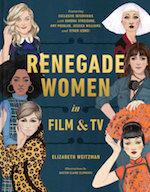
by Yona Zeldis McDonough
Golden Girls of the Silver Screen

Well told and illustrated with charm, Renegade Women is a coffee table book for our feminist pop cultural age. It offers more than 60 informative and whimsically illustrated portraits of female movers and shakers in the entertainment field.
Fiction Editor Yona Zeldis McDonough chats with author Elizabeth Weitzman about the importance of highlighting their impressive accomplishments.
Yona Zeldis McDonough: Were you intending this as a book for a YA audience?
Elizabeth Weitzman: I really wrote it for everyone. The women’s individual stories are often more dramatic than any movie could be: they’re surprising and heartbreaking and romantic and inspiring and, I think, fascinating for all ages. But as the mother of a tween girl, I do believe that we have an obligation to share with the next generation a history that many of us never learned.
YZM: Why did you decide to go with illustrations rather than photographs?
EW: I love old photos, so that was my original plan. But we were so limited by what was available in the earliest years of filmmaking that we started thinking about other ways to bring the past into the present.
I became obsessed with a site called Women Who Draw, and looked through hundreds of portfolios. I asked a few of my favorite illustrators if they’d like to submit a sample portrait, and when a young artist named Austen Claire Clements sent me her sketch of costume designer Edith Head, I knew this was the way it should be.
YZM: How did you decide which women you would include?
EW: It was not easy! If I had my way, the book would be 1,000 pages long. But it was my editor’s job to be realistic, so I did have to pare the list down. (Which pained me.) Ultimately, I wanted these stories to represent a spectrum of experience, in every way possible. That said, there are hundreds of extraordinary pioneers whose stories are also worth sharing. Hopefully there will be a Volume Two!
YZM: Are all the biographies of living women based on exclusive interviews?
EW: No actually, we had originally planned only to do historical biographies. But as I was researching the early years, I found myself wishing I could speak to some of the women about their experiences as trailblazers. So I decided to include interviews with one or two contemporary icons. And once I started, I wanted to hear more! Fortunately, we were able to make space for 10 first-hand accounts of what it means to be a pioneer. All of the interviews are truly unique, and each one sheds some fascinating light on a different element of film or television.
YZM: It seems like Jewish women are well represented here.
EW: Jewish women are part of an essential history in Hollywood that goes back to its earliest days. Some of them are still revered among film fans, like critic Pauline Kael and directors Elaine May and Nora Ephron. Others are icons, like Barbara Walters or Barbra Streisand.
But many of them, including Gertrude Berg, Irna Phillips and Shirley Clarke, have been overlooked as time has passed. I’d like to change that. In 1919, Alla Nazimova was one of the most revered women in America—and she was an openly feminist, queer, Jewish immigrant. Her story is awe-inspiring. So why don’t we know her name today?
YZM: Despite the significant contributions made by the subjects of your book, do you think Hollywood continues to marginalize the importance of women? Are women in Hollywood essentially still valued for their appearance above all?
EW: Of course we still have a very long way to go. One of the pioneers in my book is Kathryn Bigelow, who was the first woman to win a Best Director Oscar. That was in 2010. Not only has no woman won one since, but not a single woman was even nominated for Best Director this year.
That said, when I first began writing the proposal for this book, it was a big deal just to say that time was up, to even acknowledge that things need to change. So yes, we are absolutely making crucial progress. We are talking about the issues, and expanding opportunities, in a way we weren’t just a few years ago. And we really have these trailblazers to thank, for all the doors they’ve helped to open.
The views and opinions expressed in this article are the author’s own and do not necessarily reflect those of Lilith Magazine.
